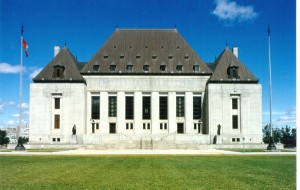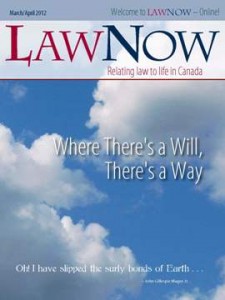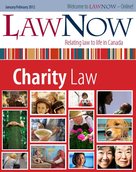Glen Race murdered two Halifax men in 2007. He pled guilty to both charges and then made an application to be found not criminally responsible (NCR).
Mr. Justice Kevin Coady of the Supreme Court of Nova Scotia reviewed the law and the legal requirements for a convicted person to be found not criminally responsible. He concluded that Mr. Race suffered from a mental disorder that made him incapable of knowing that his actions were wrong. In his case, three psychiatrists, both for the Crown and the defence agreed that Mr. Race qualified for a finding of NCR. An agreed statement of facts from the three doctors stated that he suffered from schizophrenia and that he believed he was a vampire slayer and a godlike entity ordered by angels to cleanse the world of demons and sin.
Justice Coady wrote: “After considering all of the evidence, I am satisfied that Mr. Race qualifies for an NCR defence…He suffered from a mental disorder on both occasions, that being schizophrenia. I am also satisfied that Mr. Race, as a result of his mental disorder, did not realize that these actions were morally wrong. I am satisfied that he really believed they were necessary to achieve his psychotic mission.”
Justice Coady made two other interesting observations. First, he reached out to the families of the murdered men and said that in the context of a NCR finding: “It is important to realize that Mr. Race, his family, and friends are victims as well. They are victims of a cruel and unforgiving illness of schizophrenia. Given that there is no cure and that Mr. Race’s case is so severe, their victimization will continue for the rest of their lives. This in no way minimizes the pain and loss the Knott and Brewster families have, and will continue to, experience. These homicides are different than most killings in that the perpetrator and the victims are victims.”
Then, Justice Coady added: “It is important to note that an NCR finding is not an acquittal. Mr. Race will be held responsible for killing Paul Knott and Trevor Brewster. There will be consequences for those actions and those consequences will continue for the rest of his life.”
R. v. Race, 2014 NSSC 6 (CanLII)
Article originally published in LawNow magazine, March/April 2014 issue. For more articles on contemporary issues with a legal perspective, see the LawNow website at https://www.lawnow.org/.
Bench Press: “Ski Buddy” Liability
Mark Kennedy of Colorado died on a heli-skiing expedition when he fell into a tree well.
His widow claimed that he had been paired with a “ski-buddy” who was contractually obliged to stay close to him, keep him in sight and assist or alert guides and other skiers if he saw that his buddy needed help. She also alleged that the buddy, Adrian Coe, owed a duty of care in tort law to Mark Kennedy. She sued Mr. Coe for loss of future earnings over her husband’s death.
Madame Justice Fisher of the British Columbia Supreme Court dismissed the action. She found that just because the two men had been paired to ski together there was no basis to find that there was a contract between them. Similarly, she ruled that Mr. Coe did not owe a duty of care to Mr. Kennedy, and that even if there were, Mr. Coe would have met the standard.
She summarized: “It is indeed very sad that Mr. Kennedy met a tragic and untimely death, but he did so while participating in a high-risk sport and responsibility for his death cannot be placed on Mr. Coe.
Kennedy v. Coe, 2014 BCSC 120 (CanLII)
Article originally published in LawNow magazine, March/April 2014 issue. For more articles on contemporary issues with a legal perspective, see the LawNow website at https://www.lawnow.org/.
The Supreme Court of Canada and the Case of Baby M
 In school, we learn that the Supreme Court of Canada (SCC) is the ‘highest court’ in the land (and has been since 1949). We learn that lower court decisions can be “appealed” to the SCC, and we hear about all kinds of important decisions coming from the Court. But, for most of us, the exact process of getting to the SCC, and whether that is even possible, is a bit of mystery. Add to that the influence from television crime shows, which seem to imply that anything and everything can and should be appealed …. and it is no surprise that most of us a little fuzzy on the issue of appeals.
In school, we learn that the Supreme Court of Canada (SCC) is the ‘highest court’ in the land (and has been since 1949). We learn that lower court decisions can be “appealed” to the SCC, and we hear about all kinds of important decisions coming from the Court. But, for most of us, the exact process of getting to the SCC, and whether that is even possible, is a bit of mystery. Add to that the influence from television crime shows, which seem to imply that anything and everything can and should be appealed …. and it is no surprise that most of us a little fuzzy on the issue of appeals.
Yesterday, in Edmonton, the question of appeals to the SCC formed part of the most talked-about story of the day: Baby M. In that case, the Alberta Court of Appeal had decided that M should be taken off of life support. M’s parents asked the SCC to stay that decision (i.e.: keep M on life support) in order to give them time to apply to appeal the case to the SCC. The SCC refused.
So what does all of that mean?
Most cases come before the SCC in a formalized procedure, beginning with a judgment at trial, which is then appealed to a Court of Appeal. If the litigants are of the opinion that a mistake was made at the appeal level, then one or both may ask for ‘leave to appeal’ the matter to the SCC. This happens about 600 per year. This process of leave is a surprise to many people, who sometimes think that there is an automatic ‘right’ to appeal to the SCC. There isn’t (except for a few exceptions). And leave is not that easy to get: the SCC only grants it about 80 times per year.
During the leave process, a panel of SCC judges (usually 3) does a little mini-analysis to decide if it should even hear the appeal (so it a 2-step process). More specifically, the SCC applies the criteria found in the Supreme Court Act, which states that an application for leave to appeal may be granted if the case:
- raises an issue of public importance (in other words, the case must raise an issue that goes beyond the immediate interests of the parties to the case); and
- should be decided by the Supreme Court of Canada.
But surely the Baby M case is of public importance?
Well, yes. But the SCC can refuse leave if it feels that the law in question, as socially important as it may be, has already been decided (especially if it was previously examined by the SCC itself) and there is nothing else to say on the issue. Sometimes, however, even though the SCC has already made a decision about the topic in question, it will nonetheless grant leave. This can occur, for example, when the SCC feels that the fabric of society has significantly changed since it last gave a decision on the issue.
In this case, we were not yet at the “leave” stage per se. The court was being asked for a stay in order to give baby M’s parents’ time to apply for leave to have the case heard at the SCC. But, since the stay was denied, and Baby M died, there will now no longer be a case to hear, and no need to apply for leave.
Although individual Canadians may disagree on the outcome, I think that, as a group, we can all agree that it was both inspiring and comforting and to see the speed and thoughtfulness with which our court system responded in the case.
May Baby M rest in peace.
Drunk Driving and the Constitution
This blog post is an excerpt from Bench Press in the March/April 2012 issue of LawNow magazine. To view the magazine and subscribe please go to www.lawnow.org.

Justice Jon Sigurdson of the British Columbia Supreme Court has ruled that parts of B.C.’s new drunk driving law are unconstitutional.
Changes to the province’s Motor Vehicle Act introduced automatic roadside suspensions for drivers with a blood-alcohol content of .05 or higher. Vehicles can be impounded for up to 30 days and penalties of up to $4000 can be assessed. Justice Sigurdson ruled that these changes are a justifiable infringement on Charter rights. However, he took issue with drivers who “fail” a breathalyzer test by showing a blood-alcohol level of .08 or higher. For these drivers, he wrote that the law “authorizes a search by a screening device on the basis of reasonable suspicion and impose lengthy prohibitions and significant costs and penalties on motorists, without providing motorists with any meaningful basis to challenge the validity of the search results.” He ruled that this violates the Charter protection against unreasonable search and seizure, and he concluded that in these instances, the province needs to provide an appeal process.
This decision has significance beyond the B.C. border. Alberta has enacted very similar legislation and intends to proceed with its implementation despite the B.C. court ruling.
Sivia v. British Columbia (Superintendent of Motor Vehicles) 2011 BCSC 1639 (CanLII)
Oops, a Slip of the Lip!
This blog post is an excerpt from Bench Press in the March/April 2012 issue of LawNow magazine. To view the magazine and subscribe please go to www.lawnow.org.
An Ontario man will get a “do-over” of his criminal trial after the trial judge made a small but crucial error of speech.
Madame Justice Faye McWatt of the Ontario Superior Court of Justice was instructing a jury about the importance of the presumption of innocence just before they left the courtroom to consider their verdict. She said “It is only defeated if, and when, the Crown counsel has satisfied you beyond a reasonable doubt that Mr. Guilty – I’m sorry, Mr. Wilson – is guilty of the crime charged.”
Mr. Wilson’s counsel was not amused when the jury found her client guilty. She filed an appeal, and noted “The trial judge erred in failing to order a mistrial or provide a curative instruction after mistakenly referring to the appellant as Mr. Guilty.”
The appeal will be held later this year.
Hells Angel Can't Stay
 This blog post is an excerpt from Bench Press in the January/February 2012 issue of LawNow magazine. To view the magazine and subscribe please go to www.lawnow.org.
This blog post is an excerpt from Bench Press in the January/February 2012 issue of LawNow magazine. To view the magazine and subscribe please go to www.lawnow.org.
A Federal Court of Canada judge recently ruled that Mark Stables, who has been a permanent resident of Canada since he came from Scotland as a seven-year-old child, and who has no criminal record, cannot stay in Canada.
Justice de Montigny ruled that the government has the right to expel him because he is a high-ranking member of the Hells Angels.
Mr. Stables argued that the Hells Angels is not a criminal organization, but the Judge stated that the evidence is overwhelming that the Hells Angels is “first and foremost” an organization dealing in drug trafficking, extortion, theft and murder.
He wrote: “This is not a case where the applicant did not know the nature of the organization until it was too late – either he did not care or chose to be willfully blind to its activities. Clearly, the framers of the Charter [of Rights] could not have intended that the applicant’s membership in the Hells Angels could be protected through his freedom of association and expression, despite the overwhelming criminal history of the organization.” The Immigration and Refugee Protection Act allows for a person to be barred from Canada for “organized criminality”.
Stables v. Canada (Citizenship and Immigration) 2011 FC 1319 (CanLII).
Disinherited daughters
 This blog post is an excerpt from Bench Press in the January/February 2012 issue of LawNow magazine. To view the magazine and subscribe please go to www.lawnow.org.
This blog post is an excerpt from Bench Press in the January/February 2012 issue of LawNow magazine. To view the magazine and subscribe please go to www.lawnow.org.
Four daughters who received nothing from their late father’s estate asked the British Columbia Supreme Court to vary his will.
William Werbenuk left his substantial estate to his only son, making no provision for his daughters.
The Judge stated that what was at issue was whether based on contemporary moral standards, adequate provision for proper maintenance and support was objectively considered by the father towards his daughters.
Justice Wong accepted evidence by the daughters that their father ruled the family home, and his wife and daughters by terror.
The son, on the other hand was “favoured and indulged.”
Justice Wong noted: “It is a testament to the strength of character and resilience of the plaintiffs that they rose above their upbringing and manifestly cared for their father.” He ruled that modern contemporary standards reject the father’s declared intention to disinherit his daughters, and that they had a valid moral claim to share in the family wealth.
He wrote: “The provisions of William Werbenuk’s will were not those of a judicious testator acting in accordance with society’s reasonable expectations of what a judicious parent would do in the circumstances by reference to contemporary community standards. The Judge divided the estate between the five siblings.
Werbenuk v. Werbenuk Estate, 2010 BCSC 1678
The Definition of a Mother
 This blog post is an excerpt from Bench Press in the January/February 2012 issue of LawNow magazine. To view the magazine and subscribe please go to www.lawnow.org.
This blog post is an excerpt from Bench Press in the January/February 2012 issue of LawNow magazine. To view the magazine and subscribe please go to www.lawnow.org.
A Court of King’s Bench justice in Saskatchewan recently ruled that a woman who gave birth to a baby girl in 2009 is not the child’s mother.
The child was conceived through sperm from one partner in a same-sex marriage and an ovum from an anonymous donor. “Mary” carried the baby to term. The same sex couple and Mary asked the province’s Registrar of Vital Statistics to remove the birth mother’s name from the child’s birth certificate.
Justice Jacelyn Ann Ryan-Froslie agreed.
She wrote: “It is clear from the definition of ‘mother’ contained in the Vital Statistics Act 2009, that Mary, the gestational carrier, is Sarah’s mother for the purposes of that act as she is the woman from whom Sarah was delivered. Naming her as Sarah’s mother on the registration of live birth raises a presumption that she is also Sarah’s biological mother. In this case, I am satisfied that on a balance of probabilities, that Mary, the gestational carrier, is not Sarah’s biological mother. I am also satisfied that neither (John nor Bill) nor Mary ever intended that Mary would assume any parental rights or obligations with respect to Sarah. As such, a declaration that Mary is not Sarah’s mother is warranted.”